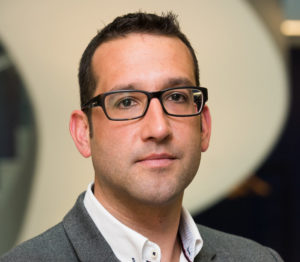Digital transformation will be a central component of any airport executive’s strategy for 2019. As pressures on physical resources intensify and passenger expectations continue to rise, harnessing technology to move ever closer to a seamless passenger experience will be crucial if airports are to remain competitive.
Alan Newbold, digital aviation leader at global engineering consultancy Arup, talks through some of the most important developments within the digital transformation agenda, and what those operating in this space should be thinking about in the year ahead.
Digital twins – harnessing data to improve the passenger experience
As the volume of passengers passing through airports across the globe continues to grow and resources come under increasing pressure, harnessing the benefits of technology to more effectively manage assets, boost efficiency and improve passenger experience will be more important than ever over the next year.
Major investment in, and updates to, physical infrastructure – such as new runways or terminal buildings – takes time, so to remain profitable as demand grows, while continuing to meet passenger expectations, airports will need to look at how they can get the most out of existing assets.
Recently we have seen airports start to harness technology and trial use of partial or full ‘digital twins’ – virtual models of their buildings and surrounding sites, where all data and information on assets and operations are brought together in one place.
These virtual models are starting to allow for real-time data collection and monitoring of entire airport premises. They mean assets can be closely tracked, any problems or breakdowns flagged instantaneously or in advance, and a preventative approach to maintenance adopted. They enable airports to get the most out of existing assets, and to make more sensible investment decisions where changes are needed. The models mean passenger, aircraft and vehicle flow can be carefully monitored, and space and infrastructure managed and adapted accordingly.
Data collected on individuals’ specific preferences as they pass through airports, such as where they shop and the facilities used, also holds huge potential for the aviation sector. Airports are increasingly looking to offer a personalized service. Many are now using data insights to tailor the services they offer passengers, and to recommend particular outlets, restaurants or amenities to specific groups prior to or upon their arrival at the terminal, via mobile.
As part of this, new models for retail are also progressing – with many airports and airlines now offering click-and-collect services. We are likely to see further progress in this space over the next year.
Together, all of this means airports will possess the ability to significantly improve passenger experience. The information collected via digital twins will provide valuable insights into the passenger journey through the site, and pinpoint exactly where it can be enhanced.
Progress on digital collaboration – sharing data for the benefit of the system
Another key to successful digital transformation across the aviation sector, and making the above a reality, will be increased data collaboration. There are signs that 2019 will be the year we see significant progress here.
Now that we are able to collect large volumes of valuable data, we need the right models to pool it and use it. This requires airlines, airports, government agencies, regulatory bodies and any other third parties involved in airport operations to work much more closely together and share the data they collect.
We saw steps in the right direction here over the last year, but 2019 will likely see barriers broken down further, as all involved increasingly recognize the importance of working together. This will require a rethink of business models and a change in the way various parties work together.
As part of this, concerns around data privacy and ethics will inevitably come to the fore and will need to be addressed. Understanding the boundaries so that progress can be made should be a priority for airport executives as we move forward this year.
Finding and equipping people with the right skills to bring everything together will also be a priority. Data scientists are in demand globally and the aviation sector is in need of individuals with the right skills to make full digital transformation a reality. Recruitment and training drives will likely intensify over the next year.
Increased automation
2019 will also be the year we see more widescale and formal testing of automated vehicle use at airports. Automated tugs, trolleys, unit load devices, passenger transportation, specialist ground-handling vehicles and others have all been tested or used in isolation or on a small-scale over the last few years.
This year, however, will witness formal, larger-scale trials that automate various elements together in a more coordinated manner and with the use of 5G. These trials will likely take place at smaller terminals and secondary airports initially, or during off-peak periods in major airports, before they are refined and rolled-out on a larger scale, pending initial findings.
These are significant steps toward the full automation of airport operations, which now looks to be a real possibility within the next five years. The next 12 months will further close the gap between vision and reality, as the first fully automated models start to be mapped out in detail.
Final thoughts
After a few years of blue-sky thinking, 2019 will see concrete progress toward digital transformation across the aviation sector. We now have the means to start putting theories into practice, and airport executives will need to embrace change to stay ahead as pressures on resources intensify.
Interested in how data can transform airports? Eloy Mora Vargas, senior airport planner, Arup, and Louise Springthorpe, Future Heathrow capacity manager, Heathrow Airport, will present a paper titled ‘Data-driven airport capacity optimisation’, at the Passenge
 About the author
About the author
Alan Newbold is Director and Digital Transport Leader at Arup. Newbold has many years’ experience in delivering digital transformation and consulting assignments across the world, including in the UK, Europe, The Middle East and Far East.

